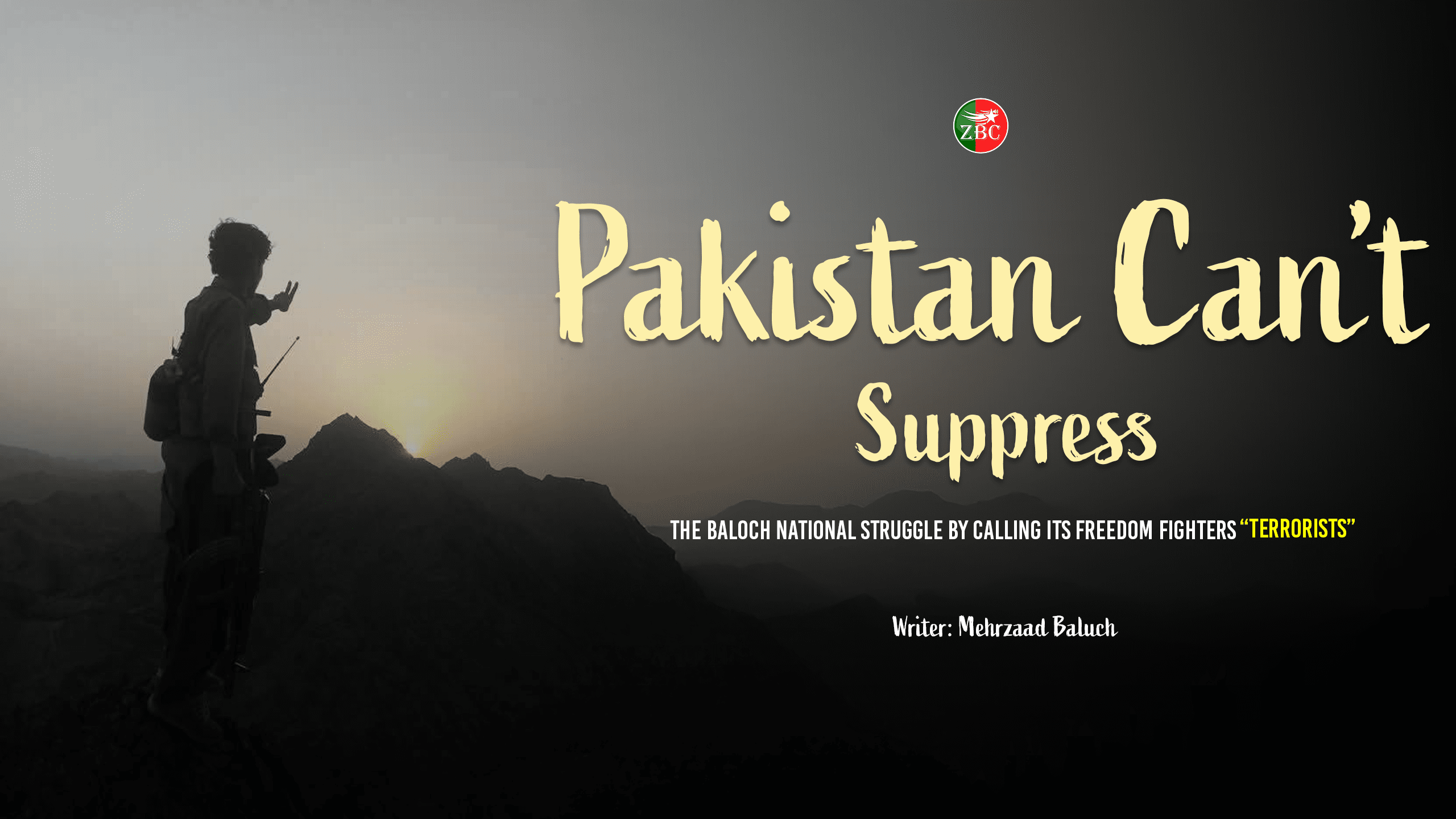
Writer: Mehrzaad Baloch
For years, Pakistan has dismissed the Baloch national liberation movement as a terrorist problem. Baloch armed organizations like the Balochistan Liberation Front (BLF) and Baloch Liberation Army (BLA) which are fighting for the independence of Balochistan are routinely described as foreign-funded actors, with Islamabad claiming they are puppets of hostile intelligence agencies. But this narrative, repeated in press briefings and on state-run media, is both misleading and dangerously counterproductive.
The armed struggle in Balochistan is not the product of external conspiracy. It is the result of long-standing political, economic, and human rights grievances that the Pakistani state has repeatedly ignored, suppressed, and denied. Pretending this is simply a security issue has only deepened the conflict and fueled the very resistance the state claims to be fighting.
The Roots Are Political, Not Foreign
To understand why organizations like the BLF and BLA exist, one must go back decades. Balochistan, which was forcibly annexed by Pakistan in 1948, has never enjoyed full autonomy. Despite being rich in natural gas, minerals and other resources, it remains the poorest and most underdeveloped. While gas from Balochistan has powered homes in Punjab for decades and its resources continue to be plundered by Pakistan and its allies, the Baloch still lack access to basic electricity and instead face what many describe as a slow genocide carried out by the Pakistani state through systematic violence and deprivation.
This economic exclusion is compounded by political repression. Peaceful Baloch nationalists have been sidelined, arrested or disappeared. Those who organize for rights, whether students, lawyers or teachers, are treated with suspicion. Thousands of Baloch civilians have been forcibly disappeared by state forces. Their families receive no answers. Mass graves have been discovered, but no serious investigations follow. In such an environment, the space for peaceful political struggle has shrunk and armed resistance has filled the vacuum.
The BLF and BLA emerged from this context. They are not religious extremists, nor do they seek to impose a radical ideology. Their stated aim is national liberation, the creation of an independent Baloch homeland. While their methods involve armed struggle, their existence reflects the total failure of the state to offer political solutions.
Liberation Fighters, Not Terrorists
It’s easy to label any armed actor as a terrorist. But the term becomes meaningless when applied selectively. Baloch armed organizations like the BLF and BLA do not target civilians. Their operations focus on military outposts, intelligence agencies and state infrastructure. Whether one agrees with their tactics or not, their actions are part of a political resistance, not nihilistic violence.
Unlike global jihadist groups, these Baloch armed organizations are rooted in a specific national history. They do not seek global domination, sectarian war or a caliphate. They are engaged in a struggle for self-determination and that distinction matters. Calling them terrorists allows the state to avoid accountability for its own actions. It also justifies a violent crackdown not only on armed fighters, but on unarmed activists and students as well.
This is the crux of the problem. By erasing the political nature of the resistance, the state delegitimizes all Baloch dissent. A student protesting a disappearance, a mother demanding the return of her son, a journalist reporting on military abuses can all be lumped together with the BLF and BLA under the same “terrorist” narrative. This not only fuels anger but pushes more young Baloch into the arms of the resistance organizations.
A New Generation Is Rising
The Baloch national movement has now entered a new phase. Young, educated Baloch are joining the armed struggle, not because they were brainwashed or paid, but because they have lost all faith in Pakistan’s justice system. When peaceful protests are met with straight firing and batons, when legal petitions are ignored, and when university students are abducted with impunity, armed resistance begins to look like the only option.
In recent years, operations by Baloch freedom fighters have become more sophisticated, more coordinated and more symbolic. From targeting military headquarters to carrying out high-profile missions like the Jaffar Express hijacking, the Baloch armed organizations are signalling that they are not a spent force but are instead adapting and growing.
Yet Islamabad continues to respond with the same old toolkit: mass arrests, media blackouts, internet shutdowns and sweeping military operations. There is no effort to engage politically, no sign of a willingness to address Baloch demands. The result is predictable: more violence, more repression and more alienation.
The “Foreign Hand” Obsession Is a Dead End
Whenever attacks occur, the government quickly blames India or Afghanistan. But this deflection ignores the reality on the ground. There is no credible evidence of foreign involvement behind the Baloch resistance. Liberation movements cannot be manufactured from outside. Baloch armed organizations have roots, networks and legitimacy within Baloch society and that legitimacy is a direct result of state brutality.
If Pakistan continues to treat this resistance as a problem of “external destabilization,” it will never solve it. Real peace can only come through internal reflection: why do so many Baloch feel excluded? Why has the state failed to build trust in Balochistan? Why are disappearances and military operations the first and often only response to dissent?
These are uncomfortable questions. But without facing them, Pakistan will remain trapped in a cycle of repression and resistance. You cannot bomb your way out of a political crisis. And you cannot call everyone who disagrees with you a terrorist.
No Dialogue Left with Pakistan
There is no room left for illusions. Dialogue with Pakistan is no longer possible. After decades of repression, the Baloch resistance has reached a decisive stage. The armed struggle will only intensify and its objective is not reform, but full independence.
Global powers, especially the United States and the United Nations, must intervene. Not to mediate, but to witness, expose and hold Pakistan accountable for its crimes. Enforced disappearances, extrajudicial killings and the criminalization of Baloch identity are not internal matters. They are violations of international law and human dignity.
The BLF, BLA, and other Baloch armed resistance organizations are not products of extremism. They are a response to systematic state violence and decades of broken promises. Their existence reflects a complete collapse of political space.
Silence from the international community only strengthens impunity. If the world believes in human rights and justice, it must act, not with statements, but with consequences. It is time to stand with those Pakistan has tried hardest to erase, and to support their right to freedom, dignity, and self-determination.

